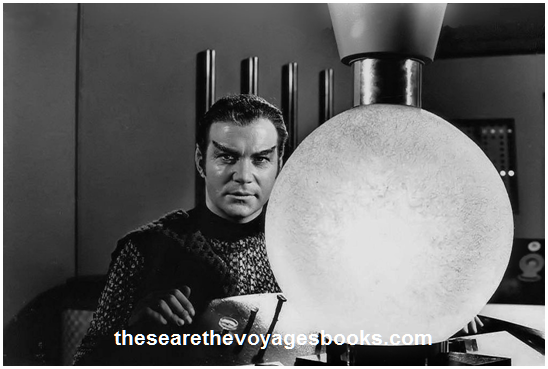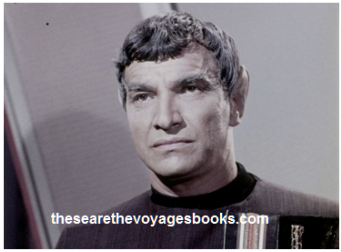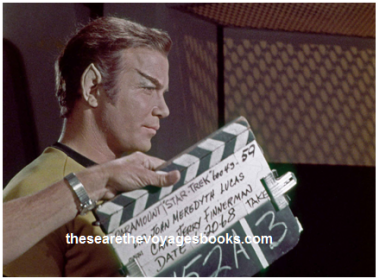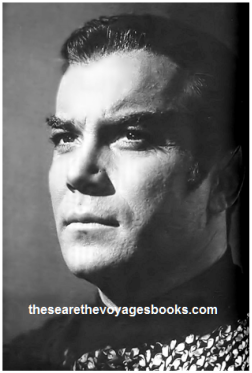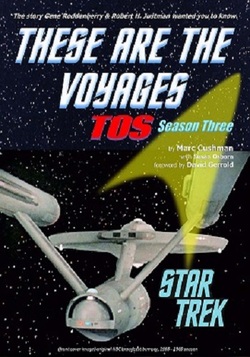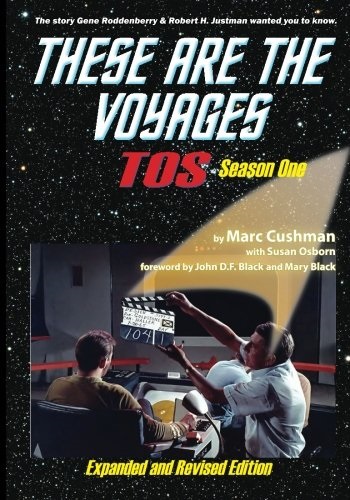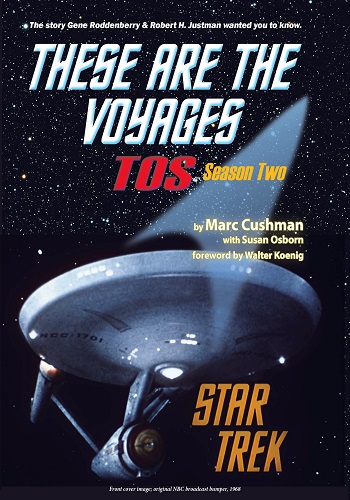THE STORY BEHIND THE STORY
Script Timeline
D.C. Fontana’s pitch / contract for ST-84: February 21, 1968.
Fontana’s story outline, “Ears”: March 29, 1968.
Fontana’s revised story outline, gratis: April 19, 1968.
Fontana’s 2nd revised story outline (adding in Klingon warships):
April 22, 1968.
Fontana’s 1st Draft teleplay: May 24, 1968.
Fontana’s 2nd Draft teleplay: delivered first few days of June 1968.
Arthur Singer’s script polish / Mimeo Department
“Yellow Cover 1st Draft”: June 7, 1968.
Fred Freiberger’s script polish (Final Draft teleplay): June 13, 1968.
Additional page revisions by Freiberger: June 14, 17, 18 & 19, 1968.
Script Timeline
D.C. Fontana’s pitch / contract for ST-84: February 21, 1968.
Fontana’s story outline, “Ears”: March 29, 1968.
Fontana’s revised story outline, gratis: April 19, 1968.
Fontana’s 2nd revised story outline (adding in Klingon warships):
April 22, 1968.
Fontana’s 1st Draft teleplay: May 24, 1968.
Fontana’s 2nd Draft teleplay: delivered first few days of June 1968.
Arthur Singer’s script polish / Mimeo Department
“Yellow Cover 1st Draft”: June 7, 1968.
Fred Freiberger’s script polish (Final Draft teleplay): June 13, 1968.
Additional page revisions by Freiberger: June 14, 17, 18 & 19, 1968.
Writer Dorothy Fontana said, “It was essentially based on the Pueblo Incident, which had happened not that long before.”
The U.S.S. Pueblo, a “communications monitoring ship,” was attacked by North Korean naval vessels and Russian-made MiG jet fighters off the waters of North Korea on January 23, 1968. The Koreans claimed the U.S. spy ship was in their territorial waters. America claimed it was in international waters. One crewman was killed in the attack, several others injured. When the Koreans boarded the ship, the captain and his crew were caught destroying electronic equipment and top secret documents. The 82 Pueblo survivors were then held prisoner in North Korea, where they were relentlessly interrogated and often tortured, for 11 long months until the very end of 1968. It was big news and a very hot topic for Fontana’s story.
“I thought that would be kind of interesting,” she said. “What if the Enterprise is trespassing where it shouldn’t, on a secret mission, and they’re caught? What happens next? That was the basis for the whole story.... The idea of Kirk running around with ears was a funny one that occurred and I said, ‘What would happen if, you know ...?’ It is always a ‘what if’ situation, or question that you ask yourself to start a story. ‘What if?’”
It wasn’t just Kirk who was running around with ears in Fontana’s first story outline, but McCoy, too. This was where the humor kicked in -- with McCoy, who in the past had unleashed numerous pointed ear barbs at Spock, now sporting points of his own.
Appropriately, the title of Fontana’s “what if” story from March 29, 1968 was “Ears.” Besides the obvious, the title also made reference to “listening in,” the intent of a ship such as the U.S.S. Pueblo and, here, the U.S.S. Enterprise.
The U.S.S. Pueblo, a “communications monitoring ship,” was attacked by North Korean naval vessels and Russian-made MiG jet fighters off the waters of North Korea on January 23, 1968. The Koreans claimed the U.S. spy ship was in their territorial waters. America claimed it was in international waters. One crewman was killed in the attack, several others injured. When the Koreans boarded the ship, the captain and his crew were caught destroying electronic equipment and top secret documents. The 82 Pueblo survivors were then held prisoner in North Korea, where they were relentlessly interrogated and often tortured, for 11 long months until the very end of 1968. It was big news and a very hot topic for Fontana’s story.
“I thought that would be kind of interesting,” she said. “What if the Enterprise is trespassing where it shouldn’t, on a secret mission, and they’re caught? What happens next? That was the basis for the whole story.... The idea of Kirk running around with ears was a funny one that occurred and I said, ‘What would happen if, you know ...?’ It is always a ‘what if’ situation, or question that you ask yourself to start a story. ‘What if?’”
It wasn’t just Kirk who was running around with ears in Fontana’s first story outline, but McCoy, too. This was where the humor kicked in -- with McCoy, who in the past had unleashed numerous pointed ear barbs at Spock, now sporting points of his own.
Appropriately, the title of Fontana’s “what if” story from March 29, 1968 was “Ears.” Besides the obvious, the title also made reference to “listening in,” the intent of a ship such as the U.S.S. Pueblo and, here, the U.S.S. Enterprise.
|
The story, at this time, was basically the same, but structured differently. The Enterprise is on an observation mission along the edge of the Romulan Neutral Zone. There is a V.I.P. passenger aboard -- Spock’s father Sarek (from “Journey to Babel”). Suddenly 6 to 15 Romulan ships appear, having gotten close enough to surround the Enterprise by using a new and improved cloaking device. They fire on the Enterprise and Kirk agrees to surrender. The treatment tells us:
|
|
As Kirk orders certain top secret equipment destroyed and a situation report relayed back to Star Fleet, Scott impetuously demands to know why he surrendered. Kirk snaps curtly that he does not have to explain his command decisions to the chief engineer.
|
The Enterprise is taken across the Neutral Zone and to a Romulan outpost. The commander they meet is a male, and he orders that Kirk and Spock be interrogated, even tortured. Before this can happen, they both take what appear to be suicide pills. McCoy is called to the base and pronounces them dead. He is allowed to return to the Enterprise with the bodies, where we learn that the pills were made of the same drug McCoy used to make it appear that Kirk died during his battle with Spock in “Amok Time.” We now discover that Kirk and Spock are on a secret mission, sent to the Neutral Zone as bait, to discover if there is any truth behind rumors that the Romulans have a new and improved cloaking device. Now, McCoy and Kirk are given makeovers -- with Vulcan/Romulan style eyebrows and ears, as well as uniforms. Meanwhile, Sarek is with the Romulan commander negotiating on behalf of the Federation, but is really only stalling and creating a diversion so Kirk and McCoy can return to steal the modified cloaking device.
Accompanying Fontana’s treatment was a note to Gene Roddenberry and Robert Justman, saying:
Accompanying Fontana’s treatment was a note to Gene Roddenberry and Robert Justman, saying:
|
I’m sure NBC will not like this premise. But we can always tell them at 10 on Friday we’re only likely to upset two of three people anyway. And they don’t have Nielsen sets.
|
On April 2, Fred Freiberger’s second day on the job, he received a memo from Robert Justman, saying:
|
I think that D.C. Fontana is correct in her assumption that NBC will not like the premise of the story. For some reason, the seizure of our Enterprise by the North Koreans -- I mean, the Romulans -- is likely to give the network the idea that we are attempting to draw a parallel between our story and current events.… I think this story can end up being one of the most exciting segments we do this coming season. However, I feel that we must be very careful to keep it a Star Trek and not let it become a Mission: Impossible.
|
As always, Justman had many specific notes, including:
|
I realize that it is pleasant and lots of fun to have Ambassador Sarek brought back into the series for this particular show. It does do something that I feel is not helpful to us; it takes a large amount of business away from Mr. Spock and gives [it] to somebody else, who gets a lot of money -- like about $3,000 for “top of the show.” But, forgetting the money, I think that the show would be better off by having Mr. Spock handle all the business and scenes with the Romulan Commander that Ambassador Sarek presently has.
|
Roddenberry, meanwhile, with his own memo to Freiberger, was thinking along the same lines, saying:
|
I have the definite feeling that we are not getting the proper use of Sarek in this story. I miss the relationship between him and Spock, the drama that is inherent in Vulcan father and son being together, especially under such dramatic circumstances. If we took Sarek out of the show, how much would it be changed materially? If we keep him in, he should be important to the fabric of the tale, not “The Pueblo” tale, but the human stories that are going on.
|
Fontana later admitted that she was merely putting frosting on the cake, and said, “Sarek did not need to be in the story; he only would have been an added bonus for the fans.”
More than anything else, this was intended as Star Trek’s retelling of what had happened to America's recent intelligence-gathering mission in Korea’s own “Neutral Zone.” Roddenberry wrote:
More than anything else, this was intended as Star Trek’s retelling of what had happened to America's recent intelligence-gathering mission in Korea’s own “Neutral Zone.” Roddenberry wrote:
|
We should check with Stan Robertson of NBC whether or not this has promotion possibilities, and, if so, should we lay it in early in our schedule and get Dorothy to write it before other scripts?… There’s a good story here.
|
“Ears” was one of four assignments Roddenberry had given Fontana on March 29. The others –“Joanna,” “Survival,” and “Van Vogt’s Robots”-- were not tied to a breaking news event, therefore less time urgent.
NBC had no problem with Star Trek exploiting a real life news story for a higher Nielsen share as long as the approach was pro-American, and so the network representatives agreed the script should be developed quickly. All haste was recommended -- the Pueblo crisis was already into its third month.
Fontana made the necessary changes and sent in her revision, dated April 19. Sarek was out and Spock was now the one negotiating with the Romulan commander (still a male), looking to buy time and distract the enemy long enough to allow Kirk to complete the covert mission.
It was now clear from the get-go that Kirk was up to something in letting the Enterprise enter the Neutral Zone. Many aspects of the story structure were in fact now very much like the episode to be produced. And, with network permission to parallel “The Pueblo Incident,” as the news services were now calling it, the title of Fontana’s story was changed to the more obvious “The Enterprise Incident.”
NBC had no problem with Star Trek exploiting a real life news story for a higher Nielsen share as long as the approach was pro-American, and so the network representatives agreed the script should be developed quickly. All haste was recommended -- the Pueblo crisis was already into its third month.
Fontana made the necessary changes and sent in her revision, dated April 19. Sarek was out and Spock was now the one negotiating with the Romulan commander (still a male), looking to buy time and distract the enemy long enough to allow Kirk to complete the covert mission.
It was now clear from the get-go that Kirk was up to something in letting the Enterprise enter the Neutral Zone. Many aspects of the story structure were in fact now very much like the episode to be produced. And, with network permission to parallel “The Pueblo Incident,” as the news services were now calling it, the title of Fontana’s story was changed to the more obvious “The Enterprise Incident.”
|
Three days later, on April 22, at Freiberger’s request, Fontana created a 2nd Revised Outline, establishing that the Romulans now use Klingon-made ships. Two days after this, Freiberger wrote Roddenberry:
As you know, I was as pleased with this outline as you. It is at network and Stan Robertson promised to give me a quick reading on it. Stan Robertson’s only contentions: the story had the danger of being too talky, needed more action, and more suspense. |
Fontana’s 1st Draft script was received on May 24. The Pueblo Incident had begun four months before, almost to the day. It was still among the most closely-followed stories in the news.
Regarding the script, Justman wrote Freiberger:
Regarding the script, Justman wrote Freiberger:
|
It is extremely exciting and action filled. The network should be charmed with it despite the fact that it doesn’t take place entirely on a foreign planet. However, the amount of action and the fact that everybody is running around with ears on should completely cover any minor objections they might have.
|
Despite believing NBC would love all the pointed ears, Justman loathed the gimmick. As early as April 2, after reading the first version of the story outline, he asked Freiberger:
|
Rather than surgically altering Captain Kirk and Dr. McCoy into the appearance of Romulans, couldn’t we establish something else?
|
|
Now, having seen the concept fleshed out into script form, it seemed to Justman, and Freiberger, as well, that a nod toward The Pueblo Incident didn’t need the additional device of Kirk and McCoy with pointed ears. Justman was further concerned that making and applying of those ears would use up valuable time and money. His memo to Freiberger continued:
|
Soon to be lost were many light moments, such as when Spock first gets a look at McCoy appearing to be of Vulcan/Romulan descent. The script tells us that he winces, his “Vulcan sensitivities pained.”
Tongue planted firmly in cheek, Justman added:
Tongue planted firmly in cheek, Justman added:
|
We should get suitable promotional value out of this show if we had a famous personality wearing the ears, as opposed to having Bill Shatner and DeForest Kelley wearing ears. For instance, James Mason with ears and/or Tony Curtis with ears would be promotable. Marlon Brando with ears would be promotable. John Wayne with ears would be promotable. Dean Martin or Frank Sinatra with ears. Jack Paar. Johnny Carson with ears. Lyndon Baines Johnson already has [big] ears, so let’s pass him over.
|
Justman’s sarcasm was ignored. McCoy would keep his ears … for now. And Freiberger had a “what if” of his own he wanted added in. What if the Romulan commander were a woman?
Fontana’s 2nd Draft script was delivered the first few days of June. Justman wrote to Freiberger:
Fontana’s 2nd Draft script was delivered the first few days of June. Justman wrote to Freiberger:
|
Miss Fontana has accomplished what you asked her to insofar as changing the Romulan commander from male to female is concerned. And she has indicated that the Romulan Commander has taken a fancy to Mr. Spock. But that is as far as it goes. Surely, we could make room for a scene between Spock and the Romulan Commander in which he, perhaps unwillingly and perhaps not, must make love to her, or at least reciprocate her advances. And certainly, we should see a few sparks smolder a little more slowly into mutual flame prior to her making her feelings known to him.
|
At the end of Justman’s four-page memo, he again lobbied for the Vulcan/Romulan romance, telling Freiberger:
|
We are again missing a bet in the Tag of this show. It is Spock who has had-- hopefully -- a relationship with the Romulan Commander. Therefore it is Spock who should wrap things up with the Commander -- and not Captain Kirk. This is a time for a good scene between the two of them with Captain Kirk as an interested and not unsympathetic bystander.
|
Freiberger liked the idea of a heated up relationship between Spock and the Romulan commander. He had Arthur Singer intercept the script on its way to the Mimeo Department, adding in a brief romantic interlude. The scene, placed into the June 7th Yellow Cover 1st Draft, had Spock take the Commander in his arms for the purpose of “raining kisses on every square inch above her shoulder.” He tells her that her name is beautiful, prompting her to stretch out on her divan, striking an inviting pose, as she asks, “Do you really like it?” Spock takes her into his arms and says, “I adore you.” And then Singer “cut to” a Fontana written scene as the spy story proceeds.
John Meredyth Lucas, hired to direct, began the pre-production phase on June 11. He had some suggestions concerning the material, which he discussed with Freiberger and Singer. And then Freiberger had his turn with the script, embellishing on the sexiness Singer had previously inserted, creating the Final Draft.
Fontana received her copy on June 13 and fired off a letter to her employers, writing:
John Meredyth Lucas, hired to direct, began the pre-production phase on June 11. He had some suggestions concerning the material, which he discussed with Freiberger and Singer. And then Freiberger had his turn with the script, embellishing on the sexiness Singer had previously inserted, creating the Final Draft.
Fontana received her copy on June 13 and fired off a letter to her employers, writing:
|
Gentlemen … These are not the outcries of a wounded writer, but of an ex-story editor with four years of service stripes for Star Trek.…We have established Vulcans do not nuzzle, kiss, hug, or display any other form of human affection. The Vulcan outward sign of affection is expressed in a certain touching of hands as demonstrated in “Journey to Babel.” If Spock behaves in such outlandishly embarrassing human manner as is indicated in this scene, he violates the character we have established for him, and the culture he comes from. And the Commander had jolly well be suspicious if Spock starts slobbering all over her. Their seduction scene should be cool, suggesting an alien sexuality -- but not human passion. Frankly, our fans -- especially the vocal ones who write a lot of letters to networks -- are very hip to what is and what isn’t “Vulcan.” They write whole treatises and fanzines -- for a large circle of subscribers -- based on Vulcan psychology, physiology, emotions, mores, and what Spock eats for breakfast. And they will tune us out if the “business” in this seduction scene goes unchanged.
|
Fontana had further objections, writing:
|
I object strongly to the removal of the brief scene in which [Nurse Chapel] and McCoy spoke to Spock, “murdering Kirk,” etc. Nurse Chapel is a character with key relationships to McCoy and to Spock. Female viewers tend to identify with her caring for Spock; and, as head nurse, she is both a professional associate of McCoy as well as someone for him to talk to. I feel the original scene as I wrote it in my second draft “said” something for these characters. In what is now left of this scene and subsequent scenes 77 and 78, the character of Nurse Chapel is reduced to an unemotional automaton.
|
Fontana also had a problem with the opening of the show. She complained:
I feel the teaser lays on Kirk’s irritability much too thickly.
In conjunction with this, she added:
I feel the teaser lays on Kirk’s irritability much too thickly.
In conjunction with this, she added:
|
I miss a specific statement from Kirk that he was to carry out a spy mission on Federation orders and that he was on that mission because Klingon vessels had been seen entering the Neutral Zone.
|
This last point, like the previous ones, was a serious and legitimate concern. It helped establish that there was now an alliance between the Federation’s two biggest enemies, and an explanation as to why the Romulans were now using Klingon-made ships. At one point in the omitted scene, Spock tells the Romulan Commander that her people are making a mistake in dealing with the Klingons who “are known to have little honor.”
On the same day that Fontana wrote to Freiberger, she went over the producer’s head, and sent a letter directly to Roddenberry, saying:
On the same day that Fontana wrote to Freiberger, she went over the producer’s head, and sent a letter directly to Roddenberry, saying:
|
These are not the wailings of a writer yelling script rape.… This -- in the areas of Spock and Christine -- is a protest against stupid writing and violation of established characters which will be charged to me. Spock, in particular, is going to be hurt if the scene I discussed here goes unchanged. Christine has been given short shrift too many times -- this is one more instance where I have tried to give her something to play -- half a page for crying out loud?! -- and it has been torpedoed. I know you’re trying to keep your fingers out of the pie -- but can you allow even Spock to get this far out of hand, as conceived by the new staff?... Forgive me if I ask too much of you. Just wanted you to know this is happening and I have protested. I’m not a new writer to this show; I have more Star Trek credits than any other writer; and I worked with you since April 1964 on the show. I think I understand it pretty well, and I hate to see your creation blasted -- because the fans will laugh.
|
Nimoy was lobbying for changes, as well. He too wrote a lengthy letter to Roddenberry, complaining about Spock’s oversexed behavior.
|
The new régime backed down. The script was changed and the sex was cooled, slightly, but not enough to appease Fontana or the fans she spoke of who wrote for the Star Trek fanzines. Forty years later, she said, “What I didn’t like was the more or less sexual tension that was put in between the Romulan commander and Spock, because I thought, ‘Ughh, I wouldn’t believe it.’ If I was the commander of that Romulan ship and a Vulcan approached me, I wouldn’t trust him for a minute. So, I felt that was not valid, that it was unbelievable. It was put in after I finished my work.... Overall, it wasn’t a bad episode; it’s one that a lot of people like. I just felt that there were certain aspects of it that didn’t work as well.”
|
More than two decades after the fact, Fred Freiberger opened a can of worms when he told Starlog magazine, “The story, dramatically, I felt, didn’t work. There were some very good elements in it. [Dorothy Fontana] probably had a better grasp of Spock’s character than I did, [but] one of the things I really wanted to do with Spock’s character was to explore the areas Gene had built into the character about a Vulcan father and an Earth mother, which I didn’t see too much of. He was just playing that cool guy all the time from what I saw. I wanted to use the other aspects of the character... which were not germane to [Fontana’s] script.”
Fontana fired back with a letter to Starlog, writing:
Fontana fired back with a letter to Starlog, writing:
|
I find amusing Mr. Freiberger’s remark that he “wanted to explore the areas Gene had built into the character [of Spock] about a Vulcan father and an Earth mother.” Apparently he was not, and is still not, aware of the fact that I wrote “Journey to Babel,” creating those two characters and their relationship and effect on Spock’s character.... Mr. Freiberger also apparently forgets the fact that I had Spock’s father, Sarek, originally as a major character in “The Enterprise Incident” story outline. It was mutually agreed Sarek got in the way of that particular story; and his character was dropped, thus bringing forward the character of the Romulan Commander.
|
The Freiberger interview continued:“So we kept working on trying to get her to rewrite that script. She was very resistant. She was not at all cooperative. She wrote it and then we rewrote the script ... extensively ... and I think we got pretty good reaction on it.”
To this part of the article, Fontana responded:
To this part of the article, Fontana responded:
|
With the exception of one major scene -- to which I did object greatly -- and some minor changes, the mimeo’d “first draft” is the same as my own second draft. Of 48 revised pages in the 68 page shooting script, 39 have one word or one line dialogue or action changed. This is Mr. Freiberger’s “extensive rewrite.”
|
|
More damaging than what was added is what was taken out. Fontana had included a of couple sections of dialogue where Kirk and his people express concern over the Romulans’ alliance with the Klingons. Also, in her script, explanations as to how Kirk can be beamed onto the Romulan ship, then off, and Spock can be beamed off during a battle stations situation. In Fontana’s version, Spock is not only instated as the new captain of the Enterprise after Kirk’s alleged death, but he returns to his ship and orders Scotty to stand down and cancel the call to battle stations. With the weapons systems temporarily deactivated, there is no reason for the Romulan ships to expend power and keep their shields raised. The enemy commander is even preparing to send Romulans to the captured Enterprise for the trip back to her empire’s home planet. And this lowering of the shields allows Kirk (and McCoy) to beam back to the Romulan flagship, and Spock, later, to be beamed off. Freiberger and Singer were the ones who had dropped these important moments from the script, creating story holes.
|
Another change made was to appease Robert Justman. DeForest Kelley lost his chance to wear pointed ears. Nothing of significance -- other than a bit of fun business -- was lost by dropping this plot contrivance. Money and time, however, were saved.
Fred Freiberger’s primary contribution to the script was rewriting the seduction scene between Spock and the Romulan Commander, losing the “raining of kisses” that Singer had added and replacing it with sensuous touching of fingertips, an act far more appropriate for a Vulcan and another who shared his ancestry.
Fred Freiberger’s primary contribution to the script was rewriting the seduction scene between Spock and the Romulan Commander, losing the “raining of kisses” that Singer had added and replacing it with sensuous touching of fingertips, an act far more appropriate for a Vulcan and another who shared his ancestry.
|
Read about the writing and the making of every episode of Star Trek’s turbulent third season in
These Are the Voyages – TOS [The Original Series]: Season Three, by Marc Cushman, available now in hardback and paperback. |
Prefer Season One or Season Two of the Saturn Award winning book series?.
They are available now at discounted prices, and autographed by author Marc Cushman when you buy publisher direct.
They are available now at discounted prices, and autographed by author Marc Cushman when you buy publisher direct.
* While some of the images are shown in color, all images in the books are in black and white.

